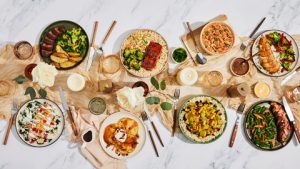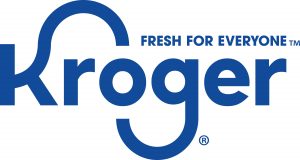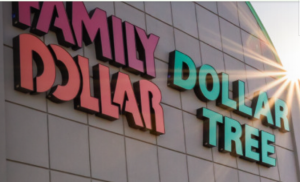Green Chef x Emily Mariko Recipe Series Launches
 Green Chef, the #1 meal kit for clean eating, is launching a new recipe series with Emily Mariko, the acclaimed content creator celebrated for her innovative lifestyle and ASMR food content. The collaboration takes inspiration from Emily’s simplistic cooking style, which focuses on fresh ingredients and creative cooking techniques, to offer customers eight delicious and elevated recipes that make clean eating at home easy and approachable.
“I’m thrilled to be partnering with Green Chef to bring my favorite seasonal ingredients, exciting flavor combinations, and simple cooking techniques to kitchens across the country,” said Mariko. “Together, we aim to make clean eating and inspiring flavor combinations accessible and convenient.”
Available the week of March 4 through the week of March 25, customers can choose from two exclusive Green Chef x Emily Mariko recipes per week. The recipes incorporate Emily’s love of farmers market hauls and spotlight a mix of organic farm-fresh ingredients, like cauliflower and apricots, as well as whole grains and premium proteins. Each recipe comes with step-by-step instructions and portioned ingredients that are delivered directly to customers’ doorsteps.
The full recipe series lineup includes:
Green Chef, the #1 meal kit for clean eating, is launching a new recipe series with Emily Mariko, the acclaimed content creator celebrated for her innovative lifestyle and ASMR food content. The collaboration takes inspiration from Emily’s simplistic cooking style, which focuses on fresh ingredients and creative cooking techniques, to offer customers eight delicious and elevated recipes that make clean eating at home easy and approachable.
“I’m thrilled to be partnering with Green Chef to bring my favorite seasonal ingredients, exciting flavor combinations, and simple cooking techniques to kitchens across the country,” said Mariko. “Together, we aim to make clean eating and inspiring flavor combinations accessible and convenient.”
Available the week of March 4 through the week of March 25, customers can choose from two exclusive Green Chef x Emily Mariko recipes per week. The recipes incorporate Emily’s love of farmers market hauls and spotlight a mix of organic farm-fresh ingredients, like cauliflower and apricots, as well as whole grains and premium proteins. Each recipe comes with step-by-step instructions and portioned ingredients that are delivered directly to customers’ doorsteps.
The full recipe series lineup includes:
- Maple Cauliflower Bowls with Seared Tofu
- Sockeye Salmon with Sweet Heat Pan Sauce
- One-Pot Herbed Chicken Soup
- Beef Tenderloin with Brown Butter Potatoes
- Chicken with Cardamom Spiced Greek Yogurt
- Ricotta Pancakes with Cherry Maple Syrup
- Chicken with Sriracha Apricot Pan Sauce
- Seared Beef Tenderloin with Ginger-Lime Aïoli
 “Emily shares our dedication to using quality ingredients and our passion for cooking simple, yet satisfying dishes. It was exciting to work with Emily to integrate her favorite flavor profiles and cooking style into our menu,” said Luke Esbenson, senior culinary development manager of Green Chef. “These recipes are crafted with seasonal, fresh ingredients in mind, making them excellent options for our Green Chef customers.”
As the first CCOF-certified organic meal kit company, Green Chef features nutritionist-approved recipes catering to various dietary preferences, including Keto, Plant-Based, Gluten-Free, and the newly introduced Gut & Brain Health. Offering 80+ weekly menu and market options, Green Chef makes it easy for customers to prepare and enjoy delicious chef-crafted recipes with clean, organic ingredients that nourish your whole body.
For more information on the Green Chef x Emily Mariko recipe series or to start your order, visit https://www.greenchef.com/pages/emily-mariko-new.
Founded in 2014, Green Chef is powering the pursuit of eating well by making it easy to cook colorful, flavorful meals in approximately 30 minutes or fewer. Green Chef’s menus cater to various dietary preferences, including keto, protein-packed, vegan, vegetarian, gluten free, Mediterranean, and more. Each delivery contains all the essentials to create three to four nourishing dinners for two to six people: high-quality, measured ingredients — including pre-made complex sauces and spice mixes — and chef-crafted recipes. For more information, visit www.greenchef.com or follow Green Chef on Facebook, Twitter, or Instagram.
For more news of interest to the foodservice industry, subscribe to Gourmet News.
“Emily shares our dedication to using quality ingredients and our passion for cooking simple, yet satisfying dishes. It was exciting to work with Emily to integrate her favorite flavor profiles and cooking style into our menu,” said Luke Esbenson, senior culinary development manager of Green Chef. “These recipes are crafted with seasonal, fresh ingredients in mind, making them excellent options for our Green Chef customers.”
As the first CCOF-certified organic meal kit company, Green Chef features nutritionist-approved recipes catering to various dietary preferences, including Keto, Plant-Based, Gluten-Free, and the newly introduced Gut & Brain Health. Offering 80+ weekly menu and market options, Green Chef makes it easy for customers to prepare and enjoy delicious chef-crafted recipes with clean, organic ingredients that nourish your whole body.
For more information on the Green Chef x Emily Mariko recipe series or to start your order, visit https://www.greenchef.com/pages/emily-mariko-new.
Founded in 2014, Green Chef is powering the pursuit of eating well by making it easy to cook colorful, flavorful meals in approximately 30 minutes or fewer. Green Chef’s menus cater to various dietary preferences, including keto, protein-packed, vegan, vegetarian, gluten free, Mediterranean, and more. Each delivery contains all the essentials to create three to four nourishing dinners for two to six people: high-quality, measured ingredients — including pre-made complex sauces and spice mixes — and chef-crafted recipes. For more information, visit www.greenchef.com or follow Green Chef on Facebook, Twitter, or Instagram.
For more news of interest to the foodservice industry, subscribe to Gourmet News.Kroger to Lower Prices After Albertsons Merger
 The Kroger Co. has shared additional insights about how the company lowered prices in previous mergers, bolstering its commitment to bring more consumers across America lower prices and more choices following its proposed merger with Albertsons Cos.
The Kroger Co. has shared additional insights about how the company lowered prices in previous mergers, bolstering its commitment to bring more consumers across America lower prices and more choices following its proposed merger with Albertsons Cos.
“We believe the way to be America’s best grocer is to provide great value by consistently lowering prices and offering more choices. When we do this, more customers shop with us and buy more groceries, which allows us to reinvest in even lower prices, a better shopping experience, and higher wages,” said Rodney McMullen, chairman and CEO of Kroger. “We know this model works because we’ve been doing it successfully for many years, and this is exactly what this merger will bring customers – lower prices and more fresh, affordable choices.”
This strategy is not new to Kroger. The retailer has invested to lower prices consistently since 2003, resulting in $5 billion in customer savings and providing more affordable products to families across America. Kroger offered an analysis that puts this significant investment into clearer context and includes additional details. Specifically, it demonstrates Kroger:
- Consistently lowered prices and improved the customer experience during previous mergers: Kroger invested more than $125 million to lower prices at Harris Teeter after its merger in 2014 and more than $100 million to lower prices at Roundy’s after its merger in 2016. Additionally, Kroger invested $2.5 million and $2.4 million in capital per Harris Teeter and Roundy’s store, respectively, to enhance the customer experience in the three years following each merger.
- Reduced profits to ensure groceries remained affordable for families across America: Kroger’s ongoing work to lower prices in the last 20 years reduced its gross margin by 5%. Meanwhile, Amazon, Ahold Delhaize, Walmart and Dollar General have increased gross margins by 22 percent, 4 percent, 1 percent and 2 percent, respectively, during the same time period.
- Made clear, consistent commitments to lower prices and improve the customer experience post-merger: Kroger will invest $500 million to lower prices following the merger with Albertsons starting day one following the transaction close. Kroger will also invest $1.3 billion to improve Albertsons’ stores following the merger, all to better serve customers.
- Will become more competitive and able to invest even more to support customers and over 700,000 associates by combining with Albertsons. Kroger’s merger with Albertsons will allow it to attract and retain more customers by lowering prices, creating a more seamless and personalized experience and expanding its selection of fresh, affordable food. By doing so, Kroger expects to grow revenues and drive additional investments in pricing and store improvements as well as wages and benefits.
To learn more about the proposed merger between Kroger and Albertsons Cos visit here.
For more news of interest to the grocery industry, subscribe to Gourmet News.
Dollar Tree Expands COO Creedon’s Leadership Duties
 Dollar Tree, Inc. announced a key role expansion for the company’s Chief Operating Officer Mike Creedon, who will add leadership of Dollar Tree & Family Dollar Merchandising and Supply Chain to his scope.
Dollar Tree, Inc. announced a key role expansion for the company’s Chief Operating Officer Mike Creedon, who will add leadership of Dollar Tree & Family Dollar Merchandising and Supply Chain to his scope.
“We are fortunate to have an incredibly talented and dedicated leadership team at Dollar Tree and Family Dollar. As we’ve worked together over the last year to build our transformation strategy, Mike has served as a key leader driving our operational path forward,” said chairman and CEO Rick Dreiling. “In this expanded role, Mike will have full end-to-end accountability for delivering a best-in-class store experience for our customers. As I shared with our associates, while Mike and I will continue to work closely together, I am committed to leading this company and I remain fully engaged in all areas of the business.
Lead Independent Director Edward J. Kelly III said, “The organization is at an important inflection point as it executes its transformation plan. With Mike in this expanded role, working closely with Rick at the helm, we bring together key elements of that strategy that will have a significant positive impact on the company.”
With this alignment, Dollar Tree Chief Merchandising Officer Rick McNeely, Family Dollar Chief Merchandising Officer Larry Gatta and Chief Supply Chain Officer Mike Kindy will report to Creedon.
Before joining Dollar Tree in 2022, Creedon held several leadership roles at Advance Auto Parts for almost nine years, most recently as EVP and president of U.S. Stores. He also held executive positions with Tyco International and ADT Security.
Dollar Tree, a Fortune 200 Company, operated 16,622 stores across 48 states and five Canadian provinces as of Oct. 28, 2023. Stores operate under the brands of Dollar Tree, Family Dollar and Dollar Tree Canada.
For more news of interest to the discount grocery industry, subscribe to Gourmet News.






